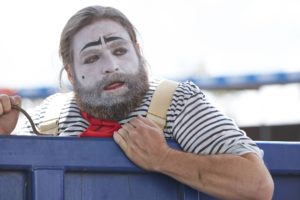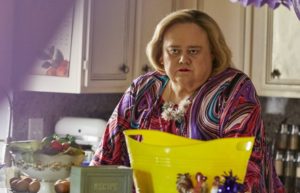7. Baskets
Baskets and the Dreams We Dare to Dream
Basing an alternative comedy that is not-so-secretly a tragedy around the life of a wannabe clown seems almost too easy. Pierrot, known as the “sad clown”, is a well-worn and widely influential stock character that has its roots in the 16th Century Italian theater of Commedia dell’Arte. Without him we wouldn’t have Chaplin’s Little Tramp or (in more contemporary terms) even the very concept of “dramedy”, an ambiguous, profound tone often employed in storytelling where laughter is spun from misfortune, the giggles leaking out between the cracks in our misery. In those terms, without Pierrot the landscape of modern stand-up and sitcoms would be much altered from their current state, so much so that Zach Galifianakis’ Baskets might come across a little unambitious at first glance.
Played with surprising restraint by Galifianakis, Chip Baskets is an aspiring clown studying at a renowned clowning academy in Paris, despite not speaking the language nor being particularly familiar with the basic tenets of physical comedy and prop gags: when one of his instructors demonstrates the act of slipping on a banana peel, Chip’s immediate reaction is to ask, alarmed, “Are you ok?”. After running out of money, Chip decides to head back home to Bakersfield, California with Penelope, a French woman whom he marries even though she states outright that she has no affection for him, is using the marriage to gain legal residency in America and will leave him when a more attractive option presents itself.

Penelope’s honesty with Chip from the get-go is one of the first indications that Baskets has little interest in the typical, overwrought dynamics at play in most sitcoms. Usually, we’d be subjected to a season-long arc of a dunderheaded man allowing an attractive woman to string him along in a way that is painfully obvious to the audience, leading us to laugh at his stupidity and eventual comeuppance at being so easily duped. To be sure, Chip is still plenty dunderheaded and firmly rooted in the delusion that he can make Penelope love him but, because of Penelope’s forthright attitude about the nature of their relationship, his actions scan more as tragic than simply idiotic even when he’s acting like a buffoon. At one point, Chip spends an entire pay cheque on a television for Penelope that is an inch larger than the one she has already been bought by a competing paramour; not only is this the ultimate gesture of dick measuring in the service of trying to woo someone, it’s also just a hair short of too absurd to not ultimately read as pitiful. Yes, Chip’s behaviour is childish, but it’s his earnest belief that this approach could actually work (mixed with Penelope’s total indifference) that makes it so fucking sad… and still pretty funny.
Elsewhere, Chip’s life is littered with even more grim reminders of his shortcomings. Eddie (Ernest Adams), his mealy-mouthed boss at the rodeo, tells Chip to drop any pretense of clowning as the dignified “Renoir”, that he will be henceforth know as “Baskets” and he should forego all the “fancy, France-y shit” in favour of just letting the bulls kick the shit out of him. Martha (Martha Kelly), Chip’s self-appointed assistant who really just thinks of herself as his friend, works for an insurance company that was unable to repair his scooter; either to make amends, out of pity or simple boredom, Martha takes it upon herself to support Chip in his endeavours, no matter how often and competently he insults her.

His twin brother Dale (Galifianakis as well, obviously, though more Southern and effeminate) manages a career community college from a rundown office that makes Saul Goodman’s look like a palace; even so, when compared to Chip’s failed ambitions and coupled with the fact that he’s always asking to borrow money from Dale, it’s not hard to see whose life is more together.
Finally there’s Christine, the mother of Chip and Dale, who you can learn a lot from just by hearing that she actually fucking named her sons that. Played with a deep, coursing tenderness by Louie Anderson (in drag), this is perhaps the most surprising and moving performance of the year across any medium. Christine is an absurdist rendering of every late-in-life, heavy-set mother ever seen on television: she takes big gulps of a drink, chokes on it and says contentedly “Whoo, that hit the spot”; she hears Martha talking to herself in the bathroom and, thinking she has gone insane, threatens to break the door down to save her; she takes Penelope out for an excursion in Bakersfield, treats her to the sights and sounds and then, quite calmly, puts a deadly serious ultimatum to the girl to leave her son the fuck alone and go back to Paris before she does her some real harm. Christine’s affection for Chip knows no bounds but that doesn’t prevent her from maternally undermining him for his stalled career plans and general inability to act like an adult. It’s not until Christine’s own mother fat shames her at a dinner event that she comes to realise the impact her disapproval has on her son; afterwards, she seeks Chip out at the pokies and they sit quietly side by side, playing their games of chance together, Chip offering his mother his uneaten dessert. It’s one of the most beautiful scenes on television in quite some time.

Jesus Christ but is this show funny when it wants to be, though! Created by the trifecta of Galifianakis, Louis C.K. and Jonathan Krisel, the comedic instincts at play meld together in a much smoother way than you might anticipate. There’s C.K.’s surreal observational approach where the familiar world is spied on a slight, jaunty tilt, which leaks through in every facet of Bakersfield. On the other end of the spectrum is Krisel’s very practiced form of anti-humour that belies obvious gags for more entrenched, uncomfortable laughs such as Dale’s cringe-worthy TV ad for his career college, as great an example of this sort of thing as you’ll find outside of Tim & Eric (“Not only am I the Dean, I’m also a student… and I’m also the janitor!”). Front and centre, of course, is Galifianakis’ unique brand of obnoxious braggadocio, similar to Danny McBride’s in Eastbound & Down but much, much stranger and more demonstrative of his improv-heavy background, as is clear in the scene where he badgers a fast-food worker with an interminable list of obscure beverages.
In the end, what leaves the most indelible impression is Galifianakis’ incredible affection for the character of Chip, the abiding respect he has for the noble pursuit of what is deemed an ignoble profession. “I am a clown!” he yells with purpose to the doubting Penelope, and though perhaps the scene is intended to smack of irony at his assurance that he is what others would call a joke, there’s a purity to it that no one can take away from him. The make-up, the puffy outfits and ridicule, it all functions as an apt metaphor for the way the world will scoff at your dreams, that even trying to achieve them will make you seem a fool to most everyone you encounter. People do not want you to be a clown because, if you actually succeed, then what does that make them?
3 Replies to “7. Baskets”